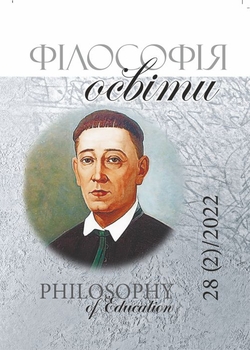Виховання і самопізнання: до актуальності філософсько-освітніх ідей Григорія Сковороди і Йоганна Готліба Фіхте
DOI:
https://doi.org/10.31874/2309-1606-2022-28-2-1Ключові слова:
Сковорода, Фіхте, моральне та національне виховання, освіта, самопізнання, секуляризація, релігія, природженість, свободаАнотація
На матеріалі філософсько-освітніх розвідок Сковороди і Фіхте розкривається взаємозв’язок самопізнання і виховання. Здійснюється верифікація методологічного положення про єдність теорії і біографії, яка знаходить підтвердження як у випадку Сковороди, так і у випадку Фіхте. Ці обидві постаті попри протилежності їх позицій щодо релігії уособлюють суперечливий характер Просвітництва і пов’язаних з ним очікувань. Передусім це торкається перспективи емансипації людини і суспільства як у секулярних версіях, так і у проектах оновленої релігії, рамкові передумови трансформації якої пропонують Сковорода і Фіхте. Порівнюються підходи Сковороди і Фіхте до розв’язання проблеми гуманізації людської природи через самопізнання, здійснюване на основі удосконалення світоглядного виховання, необхідного для ствердження розумної свободи, обґрунтовується комплементарність концептів «природженості» (Сковорода) і «покликання» (Фіхте). Розкривається евристичний потенціал анатомічних метафор Сковороди як унаочнення переходу від оптики видимого до невидимого у формуванні «нової людини». Розрізнення між видимим і невидимим та християнська етика, за Сковородою, утворюють фундаментальні підвалини навчально-виховного процесу, а головним підручником та учителем виступає Біблія, натомість Фіхте проголошує ученого вихователем та вчителем людства. Фіхте у своїх поглядах на людину займає позицію, протилежну Сковороді, відкидаючи аргументацію у дусі неоплатонізму. Його філософсько-освітні розвідки зосереджені на удосконаленні людського роду, який після наполеонівських війн редукується до німецької нації, спасінням якої у стані політичної залежності проголошується національне виховання, ресурсною базою якого є німецька культура і мова.
Посилання
Asmuth, Chr. (2017). Subjekt und Prinzip. Philosophie des Anfangs. Berlin: Logos.
Asmuth, Chr. (2020). Kharkiv lectures . Kharkiv: Andreyev Press. [In Ukrainian].
Bowley, J. E. (1999). Living Tradition of the Bible. St. Louise: Chalice Press. Christ-von We¬del, Chr. (2016). Erasmus von Rotterdam. Ein Porträt. Basel, Schwabe.
Dahrendorf , R. ( 2006). Versuchungen der Unfreiheit. Die intellektuellen in Zeiten der Prü¬fung. München: Beck.
Deichgräber, R. (2000). Mit Ohren des Herzens lauschen. Anleitung zur Meditationen der biblischen Texte. Göttingen: Vandenhoec & Ruprecht.
Ehlers, J. (2012). Die Entstehung des deutschen Reiches. München: Beck.
Enno, R. (2019). Der Europäer Erasmus von Rotterdam. Ein Humanist ohne Grenzen. Basel: Schwabe Verlag.
Felici, L. (2022). Was Europa kann – die Vision des Erasmus von Rotterdam. Marburg: Schüren.
Fichte, J. G. (2014). Einige Vorlesungen über die Bestimmung des Gelehrten. Berlin: Holzinger.
Fichte, J. G. (1988). Grundlage der gesamten Wissenschaftslehre. Hamburg: Meiner.
Fichte, J. G. (1978). Reden an die deutsche Nation. Hamburg: Meiner
Fichte, J. G. (1961). Briefe. Leipzig: Reclam.
Flasch, K. (1989). Einführung in die Philosophie des Mittelaltertum Darmstadt: Wiss. Buch-gesellschaft.
Habermas, J. & Ratzinger, J. (2018). Dialektik der Säkularisierung. Freiburg: Herder Verlag.
Hammacher, K. (2000). Fichte und Philosophie der Mauerei. Fichte-Studien 18, 65–82.
Jacobs, W. (2012) . Johann Gottlieb Fichte: eine Biographie. Berlin: Insel.
Kant, I. (1998). Beantwortung der Frage: Was ist die Aufklärung? In: Werke in sechs Bän-den. Band V1. Darmstadt: Wissenschaftliche Buchgesellschaft, 31–62.
Kimmerlich, D. (1993). Epikureische Auslegungen: Philosophische und Poetische Konzepte der Selbstsorge. Darmstadt: Wiss. Buchgesellschaft.
Koschorke, A.(2003). Körperströme und Schriftverkehr. Mediologie des 18. Jahrhunderts. München: Fink Verlag.
Kovalivsky, A. (1929). New Dates to the Double of Hrygorij Skovoroda in Lausanne Daniel Meinhard and his Family. Ukraine (36), 38–39. [In Ukrainian].
Kovalynsky, M. (1956). Hrygorij Skovoroda (The Live and Some Ideas of the Ukrainian Spiri-tual Philosopher [in Ukrainian].
Kultaieva M. (2017). Philosophical and Pedagogical Explorations of Joon Amos Komensky and Hrygoriy Skovoroda: Sense and Vocation Recalling of the Education. Philosophy of Education 21(2), 163-193. [In Ukrainian].
Lichtenberg, G. Chr. (1976). Aphorismen. Berlin: Insel.
McLuhan, H. M. (1962). The Guttenberg Galaxy. Making of Typographic Man. Toronto: Uni-versity of Toronto Press.
Ökumenisches Heiligen Lexikon. (2022). heiligenlexikon.de/Biographen M/Meinhard.html.
Ortoll, S. (2018). Zeichen entziffern. Philosophie Magazin 42, 18.
Paganini, S. (2019). Von Evas Apfel bis Noahs Stechmücken. Fake News in der Bibel. Frei-burg- Breisgau: Herder Verlag.
Popovych, M. (2008). Hryhoriy Skovoroda: Philosophy of freedom. Kyiv: Maysternya Bilo-zerskyh. [In Ukrainian].
Sagert, D. (2020). Die drei Alter des Bibellesens. In: Die Bibel. Der unbekannte Bestseller. In: Herder-Korrespondenz Spezial, April 2020, 61–62.
Schröder-Amtrup, K. (2012). J.G. Fichte. Leben und Lehre. Ein Beitrag zur Aktualisierung seines Denkens und Glaubens. Berlin: Duncker & Humblot.
Shevchuk, T. (2011). The Musical Code of Hryhoriy Skovoroda’s works . Word and Time (35), 24-34. [In Ukrainian].
Skovoroda, H. (2005a). Works. In 2 vols., v. 1: Poetry. Fables Treatises. Dialogues. Kyiv: Oberegy. [In Ukrainian].
Skovoroda, H. (2005b). Works. In 2 vols., v. 2: Treatises. Dialogues. Parables Translations. Letters / trans. from Old Ukrainian languages and examples by M. Kashuba, V. Shev-chuk. Kyiv: Oberegy. [In Ukrainian].
Sloterdijk, P. (2020). Den Himmel zum Sprechen bringen. Berlin: Suhrkamp. Sloterdijk, P. (2011). Philosophische Temperamente. Von Platon bis Foucault. München: Pantheon.
Sloterdijk, P. (2015). Die schrecklichen Kinder der Neuzeit. Ulm: CPI-Ebner& Spiegel.
Taylor, Ch. (2007). A Secular Age. Harvard University Press. 874p.
Thomä, D., Kaufmann, V., & Schmid, U. (2015). Der Einfall des Lebens. Theorie als geheime Autobiographie. München: Carl Hanser Verlag.
Thomä, D. (2018). Puer robustus. Eine Philosophie des Störenfrieds. Berlin: Suhrkamp.
Treml, A. K. (2005). Pädagogische Ideengeschichte. Ein Überblick. Stuttgart: Kohlhammer.
Vollständiges Heiligen-Lexikon (1875). Bd. 14-. Ausburg. www.zeno.org/ind/200030643ix.
Ushkalov, L. (2004). Hryhoriy Skovoroda: Seminary. Kharkiv: Maidan. [In Ukrainian].
##submission.downloads##
-
PDF
Завантажень: 891
Опубліковано
Як цитувати
Номер
Розділ
Ліцензія
Авторське право (c) 2023 Філософія освіти. Philosophy of Education

Ця робота ліцензується відповідно до Creative Commons Attribution 4.0 International License.
- Автори, які публікуються у цьому журналі, згодні з такими умовами:
- Автори зберігають авторське право і надають журналу право першої публікації;
- Автори можуть укладати окремі, додаткові договірні угоди з неексклюзивного поширення опублікованої журналом версії статті (наприклад, розмістити її в інститутському репозиторії або опублікувати її в книзі), з визнанням її первісної публікації в цьому журналі.





